
What is Pervious Concrete?
The description below is from the Pacific Southwest Concrete Alliance:
Pervious concrete is a mixture of course aggregate, Portland cement, water and little to no sand. A typical pervious concrete pavement has a 15-25% void structure and allows 3-8 gallons of water per minute to pass through each square foot. This is equal to 6,000 to 17,000 inches of rain per day!
Carefully controlled amounts of water, cementitious materials and admixtures are combined to create a paste that forms a coating around aggregate particles during mixing of the concrete. Using just enough paste to coat the particles maintains a system of interconnected voids during installation of the pervious pavement utilizing specialized placement equipment by a trained concrete contractor.
The result is a highly permeable and durable structural concrete that drains. Due to the high void content, pervious concrete is also lightweight, 1600 to 1900 kg/m3 (100 to 120 lb/ft3).
After placement, pervious concrete has a rustic, textured, organic surface which lends itself to being effectively used in ADA applications as well as providing a contrasting hardscape texture for aesthetic uses in large pavement areas.
Pervious concrete FAQs
1. How new is pervious concrete?
Pervious concrete has been around for 80 years in Europe and 30 years in the United States.
2. Will it carry cars and trucks?
Pervious concrete as strong and durable as standard concrete, it will carry trucks for 50 or more years.
3. Won't it clog?
Yes. But when you start with 20,000 inches of rain per day capacity, it is almost impossible to get it to clog below 100" of rain per day. Very few pervious concrete installations ever need maintenance.
4. What about pollution?
Pervious concrete harbors a rich microbiol environment that digests pollutants such as hydrocarbons, nitrates, and phosophates.
5. What about clay soils?
With proper design, pervious concrete can be used even with expansive soils.
Pervious Concrete Certification Course and Installation
The BS in Concrete Industry Management (CIM) is a multidisciplinary degree program that prepares men and women for a wide variety of professional careers in the concrete industry. It is the only program of its kind in California and was created with the financial and technical support of concrete industry executives. There's more information below:
College of Engineering
California State University, Chico
Chico, CA 95929-0003
Phone 530.898.5963
Fax 530.898.4070
www.csuchico.edu/cim